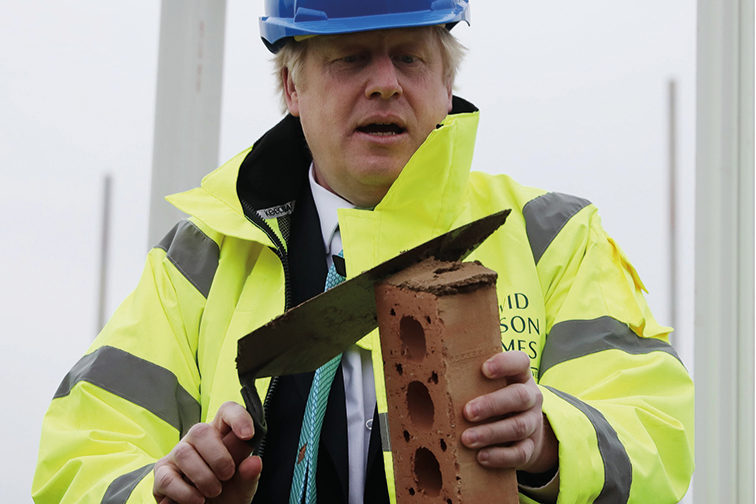Get the latest financial news, insights and expert analysis from our award-winning MoneyWeek team, to help you understand what really matters when it comes to your finances.
You are now subscribed
Your newsletter sign-up was successful
Want to add more newsletters?

Twice daily
MoneyWeek
Get the latest financial news, insights and expert analysis from our award-winning MoneyWeek team, to help you understand what really matters when it comes to your finances.

Four times a week
Look After My Bills
Sign up to our free money-saving newsletter, filled with the latest news and expert advice to help you find the best tips and deals for managing your bills. Start saving today!


Aside from a few half-baked proposals and some conjured-up targets for extra house-building, the general election campaign was strangely silent on the issue of housing. Yet, as Liam Halligan says in the introduction to his book Home Truths, "housing is the most pressing domestic challenge facing the UK today. Far too few homes have been built over the last 30 years; relentless demand, in the face of inadequate supply, has seen prices spiral upwards". With "millions of hard-working people denied the security and stability of home ownership" and condemned to a rental market in which costs have also spiralled upwards, politics is undergoing a "significant radicalisation". "Growing numbers of voters entering middle age, even high-earning professionals, now face the locked door of housing unaffordability and, quite understandably, feel capitalism isn't working for them. For today's young adults, the housing market is a source of social immobility, resentment and rancour."
We need to build more
Halligan chronicles the origins of this crisis, its evolution and the misguided policies that have exacerbated it before explaining his solutions. Home ownership in the UK has fallen from 73% in 2007 to 63% now, with the fall most startling in the age groups below 44 and in London. The reason is simple: "the average UK house price rose 219% in real terms between 1985 and 2015, compared with just 10% in Germany, 28% in Italy and 120% in France".
A rising population and growing numbers of households have increased the demand for housing while rising incomes and ultra-low interest rates have increased affordability. But whereas first-time buyers may be able to afford the interest costs of a mortgage, the capital repayments, which now account for most of the monthly cost, are a daunting challenge. Moreover, high rental costs mean that potential buyers struggle to save up for the required deposit without parental help.
MoneyWeek
Subscribe to MoneyWeek today and get your first six magazine issues absolutely FREE

Sign up to Money Morning
Don't miss the latest investment and personal finances news, market analysis, plus money-saving tips with our free twice-daily newsletter
Don't miss the latest investment and personal finances news, market analysis, plus money-saving tips with our free twice-daily newsletter
The supply response, Halligan shows, has been dismal, resulting in a huge backlog of latent demand a shortfall of up to 2.3 million over the last 20 years, according to Professor Paul Cheshire of the London School of Economics. The Barker review of housing supply of 2004 identified a requirement for 250,000 completions a year, but that number hasn't been reached consistently since the mid 1980s and is now 300,000. Moreover, many of the houses built have been sub-standard. The collapse of local authority construction since the 1970s, now seeing a very modest revival, means that the number of households on local authority waiting lists is still more than one million; housing associations only add some 30,000 properties a year. "Affordable housing" is not affordable to many and the annual cost of housing benefit has multiplied sevenfold to £23bn since the mid-1980s.
The lack of supply is widely blamed on the planning-permission process, the prevalence of "not in my backyard" opposition and England being "crowded". Yet Halligan shows that housing densities in London and other cities are low and that just 1.1% of all land in England is covered by domestic buildings (including gardens). Planning reforms have resulted in a significant increase in permissions to 370,000 in 2017 yet Shelter, a charity, estimates that one in three planning permissions granted between 2012 and 2016 have remained unbuilt. The "green belt" is widely regarded as sacrosanct, but much of it is far from green. Having more than doubled since 1979, it now covers more than 13% of England's land area, yet releasing just 3% of it would provide space for almost three million houses.
The policies we need
The government has poured money into Help to Buy, raising prices and swelling housebuilders' profits. Halligan argues it should focus instead on increasing the supply of housing. To counteract the current incentive for housebuilders to hoard land, planning permission should be viewed as a "contract to build", with stiff penalties for undue delay. An increasingly oligopolistic industry should be made more competitive by encouraging smaller builders. "If the state released just one-twentieth of its land for development, that would be enough, at current average densities, to build well over two million homes." Local authorities should be empowered to form local development corporations and buy land at existing use prices, then grant themselves planning permission before selling the plots to developers and capturing the uplift in value. Elsewhere, half the uplift in value from granting planning permission should accrue to local authorities to finance infrastructure investment and social housing.
Will these measures be adopted? Chancellor Sajid Javid told Halligan that radical steps are needed "once Brexit is done, housing is easily the most important domestic policy issue we face". Yet we have seen 18 housing ministers in little more than 20 years. Read this thoroughly researched, forensically argued and utterly convincing book and hope for the best.
Get the latest financial news, insights and expert analysis from our award-winning MoneyWeek team, to help you understand what really matters when it comes to your finances.

Max has an Economics degree from the University of Cambridge and is a chartered accountant. He worked at Investec Asset Management for 12 years, managing multi-asset funds investing in internally and externally managed funds, including investment trusts. This included a fund of investment trusts which grew to £120m+. Max has managed ten investment trusts (winning many awards) and sat on the boards of three trusts – two directorships are still active.
After 39 years in financial services, including 30 as a professional fund manager, Max took semi-retirement in 2017. Max has been a MoneyWeek columnist since 2016 writing about investment funds and more generally on markets online, plus occasional opinion pieces. He also writes for the Investment Trust Handbook each year and has contributed to The Daily Telegraph and other publications. See here for details of current investments held by Max.
-
 Barings Emerging Europe trust bounces back from Russia woes
Barings Emerging Europe trust bounces back from Russia woesBarings Emerging Europe trust has added the Middle East and Africa to its mandate, delivering a strong recovery, says Max King
-
 How a dovish Federal Reserve could affect you
How a dovish Federal Reserve could affect youTrump’s pick for the US Federal Reserve is not so much of a yes-man as his rival, but interest rates will still come down quickly, says Cris Sholto Heaton
